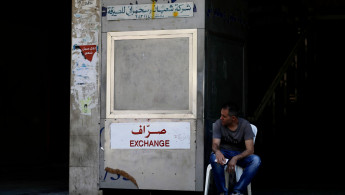Lebanese pound hits new low despite government efforts
The Lebanese pound sank to a record low on the black market on Thursday despite the authorities' attempts to halt the plunge of the crisis-hit country's currency, money changers said.
Lebanon is in the grips of its worst economic turmoil in decades, and holding talks with the International Monetary Fund towards securing billions in aid to help overcome it.
The Lebanese pound remains pegged to the US currency at a rate of 1,507 per dollar, but its value has tumbled on the black market.
Rates from three money changers on Thursday morning indicated it had lost almost 70 percent of its value there compared with the official rate.
One money changer who asked to remain anonymous said he was selling dollars at a rate of 5,000 pounds and buying them at 4,800.
Another in Beirut's Dahiya neighbourhood was buying dollars for 4,850 pounds.
In the south of the country, one person said they had exchanged dollars at the rate of 4,750.
The new nadir came despite government pledges to halt the pound's devaluation, and the money changers' union issuing a maximum daily buying rate of 3,890 and selling rate of 3,940.
Twitter Post
|
Lebanese banks have gradually restricted dollar withdrawals since late last year, forcing those in need to buy them at a higher rate on the black market.
An AFP photographer said on Thursday that many money changing shops had shuttered over what they said was a lack of dollars.
In an apparent bid to better oversee the exchange market, the central bank is set to launch a new online platform on 23 June through which changers will be asked to register all operations.
Lebanon's economic crunch has caused poverty to soar to 45 percent of the population and unemployment to rise to 35 percent.
It has also sparked steep inflation, including on imported products.
Nabil, a retired 64-year-old, said his buying power had taken a blow.
"Yesterday I went to a home appliance store to buy a fridge, and the salesman asked me for $1,200 in cash, or the equivalent at an exchange rate of 5,000, which is six million pounds," he said.
"That's twice my monthly pension," he said.
International Crisis Group on Monday warned that Lebanon needed "emergency external assistance to ward off the worst social consequences of the crisis".
Lebanon, whose debt equivalent to more than 170 percent of gross domestic product (GDP) is one of the world's largest, defaulted for the first time in March.
Follow us on Facebook, Twitter and Instagram to stay connected





 Follow the Middle East's top stories in English at The New Arab on Google News
Follow the Middle East's top stories in English at The New Arab on Google News


